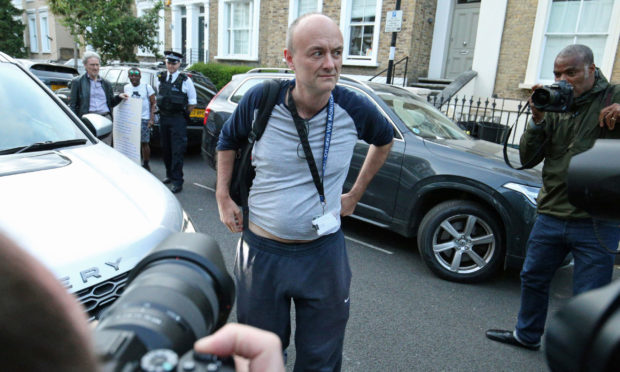Some might say the worst two words to join the political lexicon in recent years are “Dominic Cummings”.
His departure from Downing Street last week was typically egocentric, all stage management and no substance.
He didn’t leave on a point of principle, but, at least in part, apparently because he’d been sending nasty text messages about the PM’s current partner. It all rather summed up the man and his career – mean spirited, childish, pathetic.
There are those who say he was the only one among Boris’ advisers who really understood the north of England. We know he liked to visit, whether lockdown rules allowed it or not.
And he cared enough about the inhabitants of England’s north to put them in danger by driving around County Durham when he wasn’t sure he could actually see properly.
His exit, so soon after President Trump’s defeat in the US, looks like a trend: the bampots are leaving the building.
However I’d make the case for a more insidious two words that will continue to bedevil political discourse long after Cummings has made himself at home in the dustbin of history: “postcode lottery”.
It’s a term that’s been around for some time. But the coronavirus crisis has really pointed up how pointless it is.
Essentially, any time a policy success, or failure, has anything less than an equal and universal impact – that is all the time – politicians and journalists cry “postcode lottery”.
Coronavirus testing is available in Bristol but not in Brentford – it’s a postcode lottery.
Lockdown restrictions are different in Liverpool compared to Lancashire – it’s a postcode lottery.
The sun is shining in Aberdeen but it’s cloudy in Aboyne – it’s a postcode lottery.
Two elements in particular make postcode lotteries inevitable. Firstly, different areas have different needs, and policy and its rollout ought to be tailored according to circumstances.
Secondly, the central government in Westminster is not able to run everything all the time.
In 2020 all Whitehall has tried to take on – test and trace, PPE supply, border bio controls – has been chaotic at best and chronic at worst.
Regional differences are not just inevitable but welcome. Funds and policies ought to be targeted.
Occasionally that approach will throw up kinks in the system that appear unfair. For example drugs that one health board can afford but a neighbouring one chooses not to fund in favour of different therapies.
It’s correct that local authorities and services get to choose what’s best for them. And when you put it like that suddenly it sounds a lot like devolution.
It’s entirely unclear where a postcode lottery ends and devolution begins. The fact folk on the English side of the border must pay for their prescriptions but those a few miles north get them for free is essentially a postcode lottery.
But because there’s a notional national border in the way it gets the more hoity toity title of devolution.
Similarly “devo max” is just another term for postcode lottery but jazzed up to sound like a packet of exciting crisps.
Many politicians and commentators have arrived at the same simplistic answer to the myriad questions raised by political events in recent years: place power closer to the people.
Yet to do so will inevitably proliferate postcode lottery scenarios. We must either accept geographical iniquities or abandon blanket devolution.
It’s notable that Dominic Cummings has been attached to the government’s ‘levelling up’ agenda. Yet he first came to prominence leading the campaign against New Labour plans to establish regional assemblies across England.
It seems he’s more interested in imposing whatever whack job concept’s currently caught his attention than empowering people in the north or anywhere else.
He’s keen to devolve blame, not responsibility, to civil servants and public health bodies only as it becomes clear both Brexit and the government’s pandemic response will ultimately and inevitably be judged failures.
What’s fascinating is the way Westminster is in awe of Cummings’ so-called galaxy brain.
Yet the same commentariat remains dismissive of someone like Gordon Brown – a man with genuine intellect, empathy and who can point to a range of policy wins that actually improved people’s lives.
He is the most notable proponent of placing powers not necessarily nearer the people or hoarded at Westminster but at the correct level according to circumstance.
A nuanced view that sometimes devolution is the answer, sometimes it engenders unfairness.
Unfortunately the EU referendum campaign banished nuance from UK politics. But as Cummings, Trump and their ilk head for the naughty step perhaps we can send pat phrases like “postcode lottery” packing with them and welcome back patience, nuance and public service.
James Millar is a political commentator and author and a former Westminster correspondent for The Sunday Post











